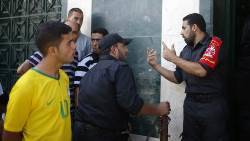Palestinian factions Hamas and Fatah have reached a partial understanding that should put plans of a unified government back on track, after being hampered by fresh rifts that followed the latest war on Gaza.
Following two-day meetings in Cairo, officials from the rival groups agreed on Thursday that the unity government, run by President Mahmoud Abbas, would take control of the war-stricken Gaza Strip.
"It was a must to move quickly and to get rid of all kinds of obstacles facing the national consensus government," Azzad al-Ahmed, head of the Fatah delegation, said.
"We discussed the importance of starting the Gaza reconstruction following the 2009, 2012 and 2014 Israeli aggressions against Gaza."
Abbas's Palestinian Authority (PA) said in a study recently that the reconstruction work would cost $7.8bn, two and a half times Gaza's gross domestic product, including $2.5bn for the reconstruction of homes and $250mn for energy.
Al Jazeera's Charles Stratford, reporting from Gaza, said that the security aspect of that agreement remained the toughest.
"We have heard these pledges before and Hamas had previously told the PA that they are ready to receive security forces to police over the region, and that they're willing to give up the borders," our correspondent explained, adding that these forces never arrived, and that the PA has accused Hamas of delaying the process.
"The unity government was hindered by rifts since the ceasefire began, which would've potentially threatened the indirect talks with Israel, and eventually the reconstruction of Gaza."
The UN, Israel and the PA reached a deal on September 16 to allow reconstruction work in Gaza, almost a month after a ceasefire pact was reached between Israel and Hamas, ending 50 days of deadly cross-border fighting.
More than 2,100 Palestinians, three-quarters of whom were civilians, were killed during the war with large swaths of the strip were left in ruins.
Gaza ceasefire
The Gaza ceasefire struck in August between Israel and the Palestinians stipulates that the PA, led by Abbas, should take over civil administration in Gaza from Hamas.
Gaza residents testify about the effects Israel and Egypt's blockade of their land has had on their lives.
But a dispute over the PA's non-payment of salaries to Gaza's public sector workers brought tensions between the two main Palestinian factions to near-breaking point.
This includes some 50,000 former employees of Hamas, including those of the security and civil services, including workers in the health and education sectors.
"All civil servants will be paid by the unity government because they are all Palestinians and it is the government of all Palestinians," Azzam Ahmed said.
Moussa Abu Marzouk, chairman of Hamas' political bureau, said control of Gaza's border crossings, another contentious issue, would lie with the UN in addition to the unity government.
"The UN will come to an agreement with Israel and the unity government on how to run the crossings," Marzouk said. He added that Rafah border crossing with Egypt was not part of the talks.
Hamas' ties with neighboring Egypt has been strained since last year's unseating of President Mohamed Morsi.
Hamas, and offshoot of Morsi's Muslim Brotherhood, has been accused by the new leadership in Cairo of meddling in Egypt's affairs.
PHOTO CAPTION
Police officers take charge as Palestinian Hamas-hired employees wait to receive partial payments outside a bank in Gaza City September 11, 2014.
Al-Jazeera


 Home
Home Discover Islam
Discover Islam Quran Recitations
Quran Recitations Lectures
Lectures
 Fatwa
Fatwa Articles
Articles Fiqh
Fiqh E-Books
E-Books Boys & Girls
Boys & Girls  Articles
Articles










